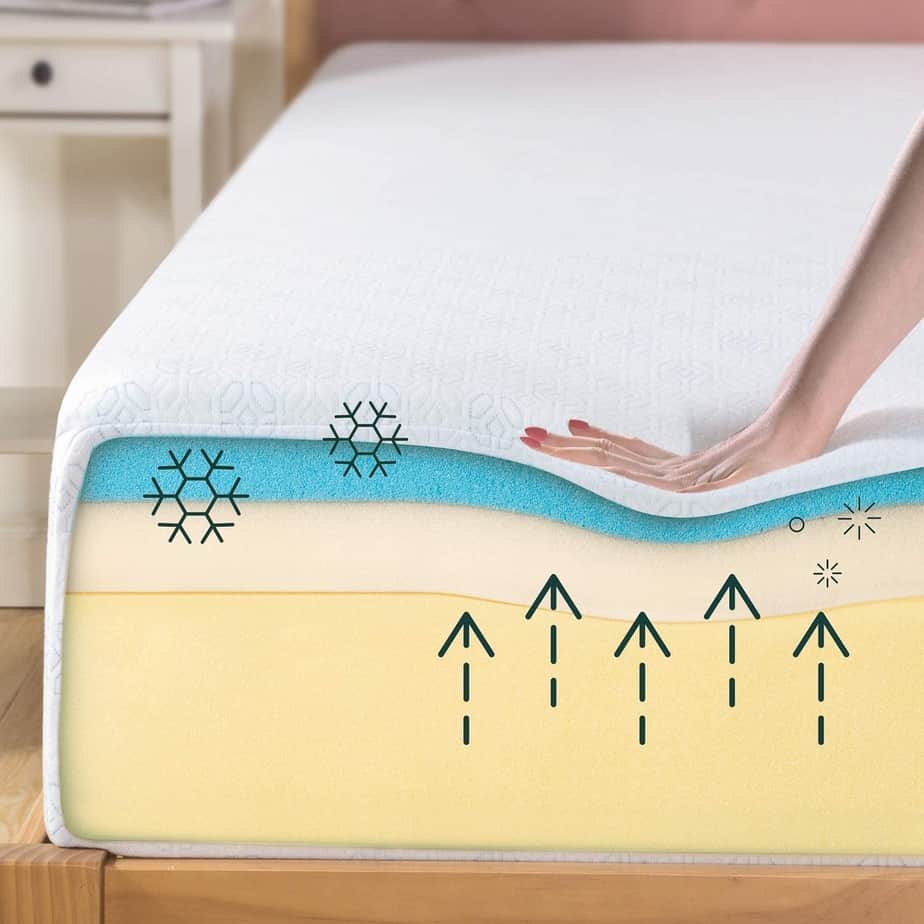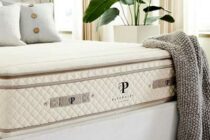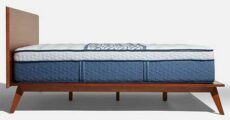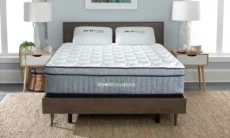With so many mattress options available, people may wonder which mattress type is suitable for them. Believe it or not, finding an appropriate mattress may significantly improve the quality of your sleep. While orthopedic mattresses provide targeted support for your back and joints, selecting the one with the right thickness, firmness, and material is key to sleeping better at night, especially for the elderly. So, in this article, we’ll discuss how to choose an orthopedic mattress for elderly sleepers.
To choose an orthopedic mattress for elderly sleepers, buy one that features medium firmness so it provides enough support and pressure relief, includes firm edge support, and offers cooling properties. Medium-firm orthopedic mattresses help provide comfort for patients with upper and lower back pain. A softer orthopedic mattress is ideal for elderly sleepers with arthritis. Orthopedic mattresses with firm edge support are beneficial to the elderly with mobility issues. Orthopedic mattresses that offer cooling features are especially useful for overweight seniors.
3 quality orthopedic mattresses for elderly sleepers
Common Health Problems Faced by the Elderly
Although we may all face certain health conditions, the elderly are more likely to develop severe and prolonged health issues. Although heart disease and diabetes are pretty common, these are not the only health problems seniors may encounter in life.
The elderly often experience health problems ranging from lower and upper back pain, to neck pain, shoulder pain, hip pain, arthritis, osteoporosis, mobility issues, and obesity.
While these conditions affect the overall quality of life of an elderly person, they also significantly influence how well they sleep. Although each of these health issues requires professional diagnosis and adequate treatment, there are a couple of ways to relieve pain and feel better, such as choosing the right orthopedic mattress like this one, that supports the entire body.
Generally speaking, orthopedic mattresses offer higher levels of support and pressure point relief compared to regular mattresses. Oftentimes, orthopedic mattresses feature softer and firmer zones across the mattress surface (softer towards the sides and firmer in the middle), creating targeted support for different parts of the body. Read our article about choosing an orthopedic mattress for sciatica pain, for advice on selecting the correct mattress for such a condition.
While each of the health problems listed above requires a specific approach, there are some general features of orthopedic mattresses that help with these conditions. For instance, every orthopedic mattress provides proper spinal support to promote optimal spine alignment for elderly sleepers. Orthopedic mattresses are soft enough to offer targeted pressure relief for those suffering from severe aches and pains in different parts of the body. Orthopedic mattresses also feature cooling properties, making them ideal for senior sleepers, especially overweight individuals. Read our article on orthopedic mattress materials to learn about the cooling features of specialized materials that are used in their production.
You might also find interest in learning if medicare will pay for an orthopedic mattress or what to do if an orthopedic mattress hurts your back. Take a look at our related articles to find out.
What Type Of Orthopedic Mattress Is Best For Elderly Sleepers
Choosing the right orthopedic mattress for elderly sleepers depends on their personal preferences and specific health conditions.
When choosing an orthopedic mattress for elderly sleepers choose one made with reflex foam, high-density memory foam, or latex for an older sleeper suffering from back pain. Choose a medium-density memory foam orthopedic mattress for a senior with arthritis, and a gel-infused foam orthopedic mattress for an overweight elderly sleeper.
Here we take a closer look at different types of orthopedic mattresses:
1. Innerspring Orthopedic Mattresses
Innerspring mattresses are the best known and most commonly used options available on the market. These mattresses include a metal wire system in tandem with springs to create a support frame that is covered in fabric. For additional comfort and support, cushioning material is added on top of the mattress.
The only issue with innerspring mattresses is that they do not always provide enough support for all parts of the body. In some cases, these mattresses are completely useless for the elderly who need pressure point relief. For example, some innerspring orthopedic mattresses include a “comfort” layer, offering extra support and optimal spinal alignment. However, even these options may not be suitable for elderly sleepers with a bad back or arthritis.
However, Innerspring orthopedic mattresses are excellent for seniors with mobility issues. They typically have firm edge support, which means that it’s easier to get in and out of bed. Additionally, since elderly people tend to spend more time on the edge of the bed, the edge won’t collapse as quickly with an innerspring mattress built with edge support.
For more information, take a look at our detailed comparison between an orthopedic mattress vs. a spring mattress.
2. Memory Foam Orthopedic Mattresses
Memory foam orthopedic mattresses are becoming increasingly popular worldwide. Along with being exceptionally comfortable, they are long-lasting and quite affordable. With so many thicknesses and density options, it is pretty easy to find the right memory foam mattress for you. Read our memory foam mattress shopping guide to learn more about the various sizes and types of memory foam mattresses.
Memory foam orthopedic mattresses are renowned for providing excellent support and pressure relief to different parts of the body. While these mattresses can be beneficial for elderly sleepers with a bad back or arthritis, selecting the correct density is essential.
High-density memory foam orthopedic mattresses like this one, offer optimal support for your spine, meaning that they are ideal for seniors with a bad back. For elderly sleepers with arthritis, medium-density memory foam orthopedic mattresses are among the best options.
Although low-density memory-foam orthopedic mattresses like these are quite soft and many people find them comfortable, they are not really suitable for elderly sleepers. Because these mattresses are too soft, the spine will move out of proper alignment and cause pain and discomfort for an elderly person.
3. Gel-Infused Orthopedic Mattresses
Gel-infused orthopedic mattresses are specifically designed to maintain a lower body temperature during sleep. While some manufacturers put a gel pad layer on top of other foam layers, others incorporate the gel layer between the layers. Whether on top or beneath, the primary goal is the same, to keep you cool and help your body regulate its temperature.
Since the foam layers used in gel-infused orthopedic mattresses are typically made of memory foam, the benefits of regular memory foam and gel memory foam mattresses are pretty much the same. Gel-infused orthopedic mattresses offer extra support and pressure point relief, making them ideal for seniors with back pain or arthritis. The gel infusion technique provides excellent cooling properties that are especially beneficial to overweight sleepers.
4. Reflex Orthopedic Mattresses
Reflex orthopedic mattresses like these are mattresses made of polyurethane foam. Reflex is a UK-based foam product manufactured and branded by British Vita. These premium line orthopedic mattresses are typically made from high-density responsive foam that is firm enough to provide a solid support for the entire body. This article from the Journal of Composites explains how polyurethane contributes to the superior comfort that is offered by these types of mattresses.
Just like memory foam mattresses, reflex orthopedic mattresses conform to your body’s shape and offer the buoyancy that prevents you from sinking into the mattress. This means that reflex mattresses are typically firmer and promote proper spinal alignment.
Reflex orthopedic mattresses are ideal for elderly sleepers with bad backs. They provide excellent spinal alignment, proper weight distribution, and contouring support to different parts of the body. While some reflex orthopedic mattresses can be used for pressure point relief, they might not be soft enough to help seniors struggling with arthritis.
5. Latex Orthopedic Mattresses
Latex mattresses are incredibly comfortable and durable. Along with being eco-friendly, latex orthopedic mattresses offer enhanced sleep health as discussed in this article from the Journal of Industrial Ergonomics. Latex orthopedic mattresses are beneficial for elderly sleepers with back pain or arthritis. Along with being firm enough to provide proper support for the spine, latex mattresses can be soft enough to relieve back or joint pain. Because latex mattresses are breathable, overweight sleepers can also benefit from using them due to their temperature regulation qualities.
While synthetic and blended latex mattresses are also comfortable, natural latex mattresses like these are much more supportive, breathable, and durable. Just like memory foam mattresses, latex mattresses come in a variety of density and thickness options. However, latex is naturally firmer than memory foam, so if you are looking for an orthopedic mattress that offers superb support, latex could be the right choice for you. Although latex orthopedic mattresses are ideal for seniors, they are not always suitable for those with mobility issues. Latex mattresses do not always provide firm edge support.
6. Orthopedic Mattresses with Natural Fillings
Orthopedic mattresses with natural fillings are also quite popular. While some mattresses incorporate organic cotton, others are made of wool or down feathers. Before deciding which orthopedic mattress to purchase, you should determine how much softness or temperature control your elderly relative needs in a mattress. This article, published in the Drvna industrija Journal explains why natural materials in a mattress improve sleep quality.
While orthopedic mattresses with natural fillings can be pretty fluffy and comfortable, they do not always provide enough support or pain relief for elderly sleepers. Orthopedic mattresses with natural fillings are more breathable and offer adequate temperature control. They are also durable and can last for years when maintained properly.
It is recommended to use orthopedic mattresses with natural fillings if your elderly sleeper does not struggle with back pain or arthritis. These mattresses would be more suitable for seniors with mobility issues and obesity. If a senior sleeper prefers sleeping on firmer surfaces that support shoulders, hips, and lower back, down feather or wool-based orthopedic mattresses would be ideal. If an elderly sleeper is looking for a softer mattress for pressure relief, a cotton orthopedic mattress would be a better choice.
While some seniors need their beds to be soft, others feel more comfortable when sleeping on a firmer surface. On the other hand, some elderly sleepers prefer having their beds low, close to the ground, while others do not mind sleeping on a higher-profile bed. In addition, overweight seniors pay more attention to heavy-duty orthopedic mattresses, while those in the normal weight range do not. Our orthopedic mattress price guide is a good place to start when considering which orthopedic mattress will suit specific budgets and needs.
You might also find interest in reading our ultimate orthopedic mattress weight guide in addition to our related article explaining how to choose an orthopedic mattress you can flip and why you need to.
Choosing Orthopedic Mattresses For Seniors With Bad Backs
Osteoarthritis and spinal stenosis are two of the most common causes of lower back pain in seniors. While struggling with a bad back requires professional diagnosis and special treatment, you can relieve pain by choosing an orthopedic mattress that offers enough support for your body.
Seniors with bad backs should buy mattresses made of high-density memory foam, latex, or reflex foam, with medium-firmness.
When choosing an orthopedic mattress for a bad back, memory foam and latex mattresses should be considered first. The main reason for this is that memory foam and latex offer excellent support and promote optimal spinal alignment which is essential for elderly sleepers with bad backs.
You should select a medium-firm orthopedic mattress for spinal support and pressure relief. You can also go for a firm mattress for more support, but you will no longer get as much pain relief. While latex mattresses are already firm enough, memory foam mattresses are available in multiple density variants. A high-density memory foam orthopedic mattress like this is suitable for elderly sleepers who suffer from back pain.
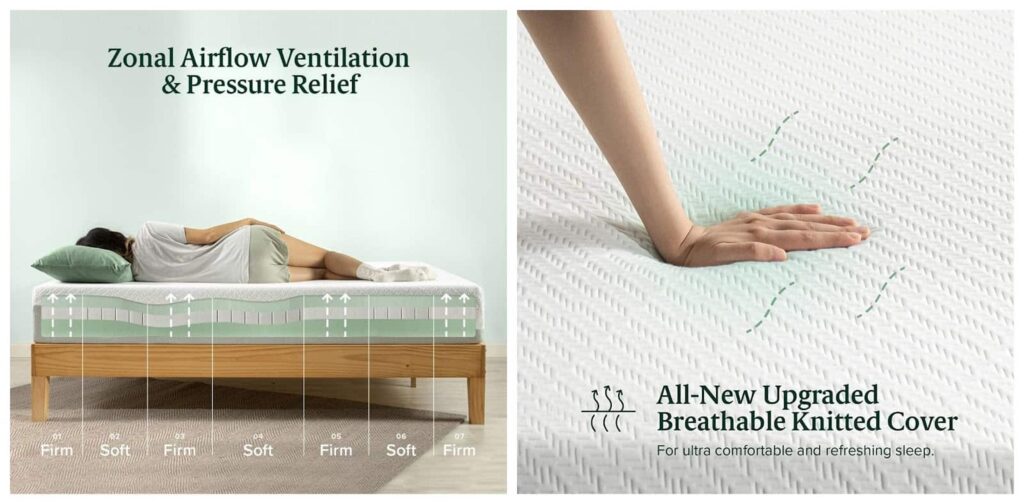
A Summary of the Best Orthopedic Mattresses for Seniors with Bad Backs:
| Mattress Type | Amazon Product | Price |
| High-Density Memory Foam Mattress | Signature Sleep Memoir High-Density Memory Foam Mattress | ~$395 |
| Medium-Firm Gel Memory Foam Mattress | Nectar Medium-Firm Gel Memory Foam Mattress | ~$700 |
| Firm Memory Foam Mattress | Simmons Firm Memory Foam Mattress | ~$585 |
| Firm Organic Latex Mattress | Pure Green Firm Organic Latex Mattress | ~$750 |
Make sure to also take a look at the 7 benefits of an orthopedic mattress and how to choose the right one for more detailed information.
Orthopedic Beds For Elderly People With Mobility Issues
When it comes to seniors with mobility issues, choosing the right mattress type may not be enough. In addition to the mattress, you should select a bed that is easy to get in and out of.
Elderly sleepers with mobility issues and limited strength should use an adjustable bed that provides comfort and accessibility. Choose a low-profile bed, or a bed with rails to make getting in and out of bed easier for people with limited strength.
You should consider the particular mobility issue before purchasing the right bed and mattress. Read our article about choosing an orthopedic mattress for an adjustable bed to learn more about the types of beds that are beneficial for people with mobility limitations.
Some of the most common conditions in seniors that can contribute to various mobility issues include chronic diseases like diabetes, joint problems, muscle weakness, pain in different parts of the body, and neurological difficulties. Selecting the right bed can significantly improve sleep quality for those facing mobility issues or limited strength.
For example, low-profile beds can assist seniors who find it challenging to get in and out of bed. Another helpful type of bed is the one with rails on the sides that make it easier for seniors to lift themselves out of bed. While electric or manually adjustable beds allow seniors with limited mobility to lean and sit up in bed.
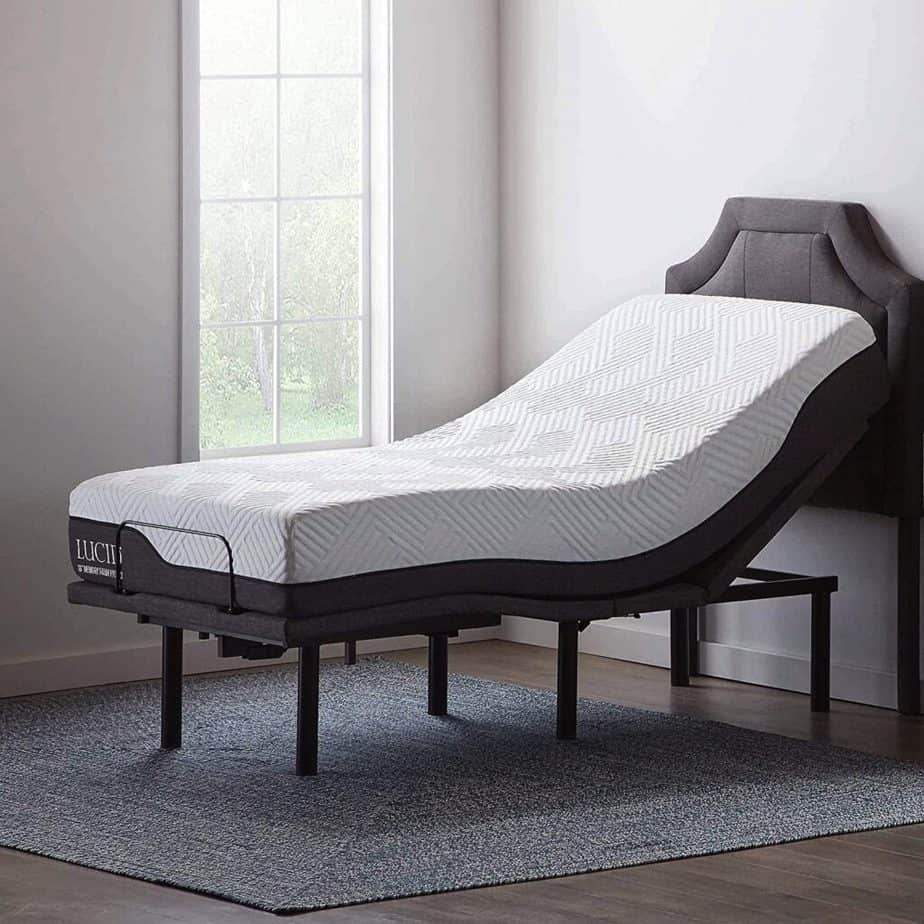
An adjustable bed like this would allow seniors with mobility issues to feel more comfortable in bed. Image Source: Amazon.
Features of Orthopedic Mattresses For Seniors With Arthritis
Arthritis is common among seniors and is one of the most widespread causes of physical disabilities and mobility issues in older people. While arthritis affects seniors’ lives in many different ways, it also decreases the quality of their sleep. Selecting the right orthopedic mattress could really benefit seniors with arthritis.
Seniors suffering from arthritis would benefit from orthopedic mattresses that feature medium-density or softer low-density memory foam. Finding a bed that offers both spinal support and pressure point relief can be beneficial for sufferers of arthritis.
Some of the most common areas affected by arthritis in senior patients include hands, wrists, elbows, shoulders, neck, knees, ankles, and feet. Joint stiffness and swelling often lead to severe pain and selecting the right orthopedic mattress is key to relieving pressure points.
Clearly, getting in and out of bed can be a challenge for seniors with arthritis. It is not that easy to settle into a comfortable position, doze off, and sleep well when you are in pain due to arthritis. Read our article about how to use a mattress topper to soften a bed for more ideas on how to reduce arthritic pain.
Choosing an Orthopedic Mattress for Overweight Elderly Sleepers
Carrying extra weight is another problem that significantly affects seniors’ health. Along with leading to many other health issues, being overweight often worsens sleep quality. While special diet and treatment are necessary, overweight elderly sleepers can feel more comfortable when sleeping on a ventilated orthopedic mattress which allows them to sleep cooler.
When searching for a bed for overweight elderly sleepers, consider a bed that is made of heavy-duty materials and is firm. The bed should also feature a gel-infused memory foam layer for enhanced temperature regulation.
Generally speaking, orthopedic mattresses for heavy sleepers should be made of heavy-duty materials to withstand extra weight and last longer. Overweight seniors would feel more comfortable when sleeping on a relatively firm surface. Orthopedic mattresses with medium or high-density comfort layers are recommended for plus-size sleepers, to avoid sinkage.
Innerspring orthopedic mattresses are among the most popular options for overweight seniors. Since heavy sleepers may get hot while sleeping, gel-infused memory foam or a breathable material should be used as the top layer.
Summary of Orthopedic Mattresses for Elderly Sleepers
| Health Condition of Elderly Sleepers | Features To Look For In A Orthopedic Mattress | Example On Amazon | Price |
| Bad Back | Medium firmness for adequate spinal support and pressure relief. | Pure Green Organic Latex Mattress – Medium Firmness | ~ $950 |
| Mobility Issues | Firm edge support and suitable height for the feet to easily reach the floor. | Molblly Innerspring Hybrid Mattress | ~ $320 |
| Arthritis | Softer material for better pressure point relief. | Nectar Medium-Firm Gel Memory Foam Mattress | ~ $700 |
| Overweight | Thickness and high-density for durability. Firmness to avoid sinkage. Cooling features for extra comfort. | Avenco Hybrid Innerspring and Gel Memory Foam Mattress | ~ $500 |
Key Takeaways
Optimal Firmness and Support
When choosing an orthopedic mattress for elderly sleepers, a medium firmness level is usually ideal as it offers a balanced blend of support and pressure relief. Especially for those suffering from back pain, a mattress that provides good support to the spine and joints is crucial. For individuals with arthritis, a softer mattress might offer better comfort.
Material Selection
The material of the mattress plays a pivotal role in the comfort and support it provides. High-density memory foam, reflex foam, and latex are among the recommended materials for elderly individuals with back pain due to their excellent support and spinal alignment properties. Meanwhile, gel-infused orthopedic mattresses provide cooling effects beneficial for overweight elderly sleepers.
Edge Support and Mobility Assistance
Firm edge support in a mattress is beneficial for elderly individuals with mobility issues, making it easier for them to get in and out of bed. Additionally, for those with severe mobility limitations, an adjustable bed can significantly improve sleep quality and ease of movement.
Temperature Regulation
Orthopedic mattresses with cooling properties like gel-infused layers are especially useful for overweight seniors who may sleep hot. These features help in maintaining a comfortable sleeping temperature throughout the night.
Specific Needs Based on Health Conditions
The choice of an orthopedic mattress should be tailored to the specific health conditions the elderly individual is experiencing. For instance, medium-density or softer low-density memory foam mattresses can provide pressure point relief essential for seniors with arthritis. In contrast, a firmer surface may be better suited for overweight elderly sleepers to prevent excessive sinkage.
Investment in Quality Sleep
Selecting a quality orthopedic mattress is an investment towards improving the sleep and overall quality of life of elderly individuals. It’s essential to consider the long-term benefits of a supportive, comfortable, and durable orthopedic mattress in alleviating aches, pains, and sleep disturbances commonly experienced by the elderly population.

